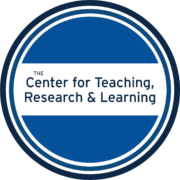Career Readiness in the Classroom: Helping Students Connect Your Curriculum to Life After College
Created by Emily Lelandais, Liz Romig, and Anna Litman in the Career Center in collaboration with CTRL
Published 2025/24/2
As faculty, you are instrumental in preparing AU students for career success after graduation. The knowledge and skills you help students develop through your classes and assignments enable them to obtain information, think critically, work in groups, communicate through various media, and more. These learning outcomes that you strive to achieve daily in your classroom are closely related to the essential skills sought after by employers across all sectors. (Source: National Association of Colleges and Employers (NACE), 2023. What is Career Readiness?).
Conceptualized as the Career Readiness Competencies by NACE based on their annual surveys of a large sample of U.S. employers across various industries and sectors, the skill set that provides a solid foundation for further career development includes eight Communication; Critical thinking; Equity and Inclusion, Leadership; Professionalism; Teamwork, Technology, and Career and Self-development The NACE Career Readiness framework has become widely accepted by universities and colleges nationwide, as it provides the roadmap and language to articulate the career-related value of college experience. To transition successfully from college into careers, our students need to demonstrate their self-awareness regarding their readiness for the professional workplace.
When hiring AU students, employers overwhelmingly indicate that they are seeking “all majors” rather than specific degrees. Why? Because liberal arts education and liberal arts majors allow students to develop the career readiness competencies employers seek. (Source: “How College Contributes to Workforce Success: Employer Views”, 2021 the American Association of Colleges and Universities)
However, students often don’t recognize how their AU coursework relates to their career preparedness, especially in courses that cover topics that are not specifically related to a student’s intended career. Have you ever had students say, “Why do I need to know calculus? It’s not related to the job I want in public policy,” or “This essay is busy work, I’ll never write an essay in my job”? Students need faculty support to understand how the critical thinking skills developed in calculus and the writing skills honed in writing classes connect to the skills they will use in their careers. Illuminating these connections is an exciting opportunity and responsibility that faculty have for their students!
Throughout the semester, you can help your students see the connections between your assignments and the skills valued at the workplace. You can encourage students to learn and use the language that resonates with employers. Doing so doesn’t require major changes to how or what you teach. Instead, try reframing the intention behind your assignments to emphasize the transferability of the skills and content provided in your course and use NACE’s career readiness framework when applicable. Even small adjustments to your course can help students recognize and articulate their skills and become confident about their career readiness.
Practical Suggestions for Integrating Carer Readiness Competencies into the Classroom
Syllabus
- Incorporate career readiness language when describing learning outcomes and skills that students will develop in your course. (See the description of career readiness competencies and sample behaviors on the Career Center’s website)
- Tag course assignments with relevant Career Readiness Icons (request the icons from the Career Center)
- Add a section in your syllabus that provides information about career services and experiential learning opportunities related to your course content. Encourage students to utilize these resources. You may incentivize students to attend career events (workshops, networking, etc.) by offering an extra credit.
- Require students in upper classes to work on their professional development portfolio, including resume/CV, sample cover letter; sample elevator pitch; LinkedIn profile; self-reflections; etc.
In class
- Highlight the career readiness competencies developed through assignments. Use real-world examples to illustrate the applicability or transferability of the assignment and related skills in various industries/professional settings
- Provide reflection opportunities linking coursework to career competency development.
- Invite alumni as guest speakers in class to share their career paths and connections they’ve made between their coursework and current jobs.
- Facilitate discussions with students on career topics. You may want to share your own career story. Encourage students to make connections between their career interests and the skills they are learning in your course.
Assessment
- Have students create “impact statements” on assignments and projects, summarizing competencies gained.
- Enable self-reflection on competency growth through assignments.
- Use career readiness language (competencies’ description and sample behaviors) in your feedback to illuminate development areas.
For more competency-specific examples, check out the AU Career Center Faculty Guide: Faculty Resource Guide – Career Readiness Competencies
Conclusion: Additional Resources
The path from the liberal arts classroom to a meaningful career is clearer than students realize. With faculty guidance, students will recognize the connections between academic work and workplace success.
The career office provides curriculum consultations, class presentations, and other faculty support, to integrate career readiness into coursework. Visit our page for more faculty resources to help students articulate the versatile skills gained through liberal arts to employers.
Do you have questions or want suggestions for your syllabus? Contact the career office associated with your school.
- CAS/SOC/SOE/SPA: AU Career Center, Liz Romig, Director of Career Education and Outreach, 202-885-1813 // romig@american.edu
- SIS: School of International Service, Office of Career Development, siscareer@american.edu
- Kogod: Kogod School of Business, Career Development, kogodcareers@american.edu

